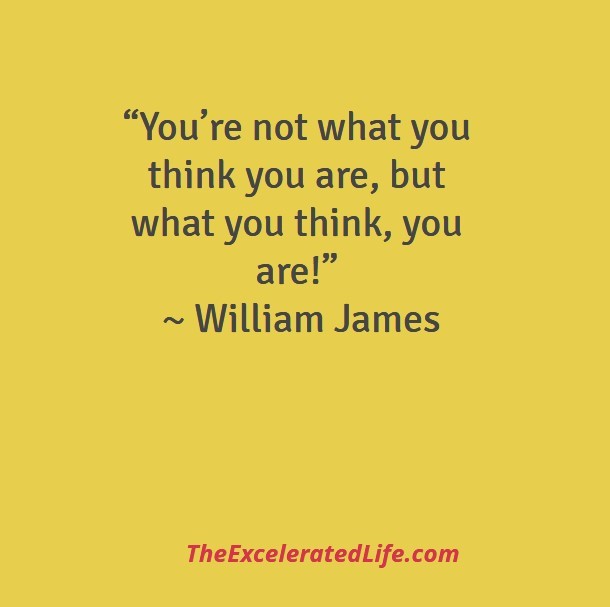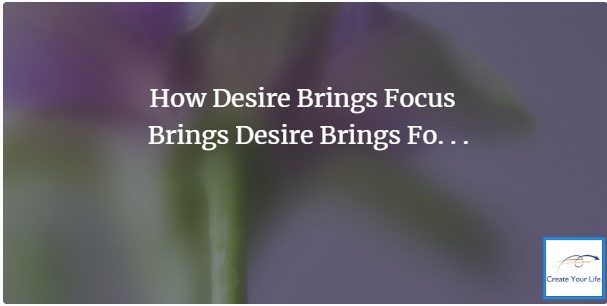When you really, really want something, and the desire is strong, you focus on that thing you want. Desire leads to focus. However, the relationship goes both ways. Increasing your focus on a desirable objective makes you want it even more. Focus leads to desire.
TheExceleratedLife.com

A Tale Of Two Dreamers
Les dreamed of being a musician – an accomplished guitarist. But he had a few obstacles in his way. He didn’t have a guitar. He needed a good teacher. Plus, he had to earn a living, so he’d have difficulty finding time to practice. Yet his desire to become a guitarist was strong. But he focused on all the things he didn’t have: a guitar, a teacher, time to practice. And as he focused on these things he lacked, his desire to be a great musician began to wane. As his desire decreased, his focus on this dream became less sharp and clear. Diminished desire led to diminished focus led to diminished desire led to . . . Before Les realized it, five years had passed. He occasionally indulged in “what if . . .” thinking as he remembered his old dream, but his burning desire had grown cold.
Paul dreamed of being a musician, too – an accomplished guitarist. And he had some obstacles in his way. He didn’t have a guitar. He needed a good teacher. Plus, he had to earn a living, so he’d have difficulty finding time to practice. Yet his desire to become a guitarist was strong. So, he focused on what could do. He found a cheap but usable guitar at a second-hand shop. It wasn’t great but it would do until he could get a better one. He searched online videos and found some beginner’s lessons to help him get started. He gave up going out with friends after work, instead, choosing to go home to practice. As he focused on what he could do, his desire to become a musician grew stronger. As his focus and desire grew, Paul was able to find even more ways to get past the obstacles and to follow his dream. In a few years, Paul was a skilled musician, playing in a local band.
The Relationship Between Focus And Desire
When you really, really want something, when the desire is strong, you focus on that thing you want, right? We’ve known this for a long time – we focus our attention on what we want.
Most people think this is one-directional. Desire leads to focus. However, current research shows that the relationship goes both ways. Increasing your focus on a desirable objective makes you want it even more. [Robison]
Some of us have a tendency to focus on what we u-don’t want, but we’ve already seen that doesn’t work. Remember the old adage: What you focus on expands.
Writers have written for years that in order to reach a goal, you must have a burning desire to accomplish it. Now, we have a tool to help create that important desire. Focus. Focus on what you want.
Where you focus your attention powerfully affects your state of mind and what happens in your life. [Sorrell] “Whatever the mind of man can conceive and believe,” said Napoleon Hill, “it can achieve.” So be careful what you believe. If you are focused on what you don’t have, or what you can’t do, or what happened in the past, or what might happen in the future, [Sorrell] you have little chance of building your desire. Shift your focus to what you want and what you can do right now.
Don’t Focus On What You Don’t Want
So, if focus builds desire, why do we focus on the things we don’t want? One very simple reason is fear. “We are far too used to focusing on the fears surrounding the goal,” writes blogger Ro Tamayo, [Tamayo] instead of focusing on the goal and our reasons for wanting to achieve it.
Worry and rumination can become a downward spiral. You know – what you focus on expands. When you catch yourself in this cycle of thinking about your doubts, fears, and worries, stop. Change your thinking and change your focus.
(For some specific practices you can use to stop the cycle of rumination, see The Happiness Hundred, particularly the sections “Avoid Overthinking And Social Comparisons” and “Develop Strategies For Coping”.)
Where Is Your Focus?
We create a strategy in life by the hundreds of daily decisions we make about where to spend our time, our energy, and our money, writes Clayton M. Christensen in How Will You Measure Your Life?
[Christensen]
You can dream about what you want to be, do, and have, and talk about it all day long to anyone who will listen. But what you dream about and what you talk about are overshadowed by what you do. As Ralph Waldo Emerson said, “Who you are speaks so loudly I can’t hear what you’re saying.”
Want to know where your focus is? Look at your behavior and where you spend your resources of time, energy, and money. If it doesn’t match your true desire, it’s time to change your strategy and your focus.
How To Focus On What You Desire
In an article on the LifeHack blog, Donald Latumahina uses the rules of Mark Joyner’s Simpleology to identify the “Three Basic Steps to Get Your Desire with the Least Effort”.
The three steps are:
- Know exactly what you want. [Latumahina]
- Always follow a straight line. [Latumahina]
- Sharpen your saw. [Latumahina]
Knowing exactly what you want brings clarity and clarity brings focus. Brian Tracy, an expert in goal achievement, calls this the first rule of goal setting. “Be clear about your goal,” Tracy says, “but be flexible about the process of achieving it.”
When you follow a straight line, you are taking the shortest route between two points, where you are now and where you want to be. If you try to do too many things at once, you’ll lose focus. If you get bogged down in busywork, you risk straying from the straight-line path and, again, you lose focus. When you start a task related to your goal, ask yourself, “Is this on the straight line?” If the answer is ‘no’, stop doing it. [Latumahina]
Sharpening the saw is the 7th of Stephen Covey’s 7 Habits of Highly Effective People. It involves the care of your most important asset – you. It means getting proper nutrition, sufficient exercise, and ample rest. You know, the fundamentals. It could also, Latumahina tells us, involve learning a new skill or using a new tool — things that can help us work smarter, not harder. [Latumahina] If you find your focus dimming, take time to sharpen the saw.
What Truly Matters?
In the book, Wait, What?, author James E. Ryan covers what he terms the five essential life questions. One of these “essential questions” is “What truly matters?” [Ryan] When you ask, and answer, “What truly matters?”, you “separate the truly important from the trivial”, so that you can focus on what’s important.” [Ryan]
“Asking yourself and others what truly matters,” writes Ryan, “enables you to cut through distractions, tangents, and irrelevant details and to stay focused on the real and important tasks that have to be completed.” [Ryan] You follow the straight line.
Focus and desire help us achieve any goals we want strongly enough. These include goals that lead to Hedonic happiness, which is generally short-lived. These are typically oriented around things or personal status — a bigger house, bigger car, more money, 6-pack abs, etc.
Research in Positive Psychology has identified another type of goal that leads to well-being and flourishing. These goals lead to a life of meaning and purpose. These are SMART+Plus™ goals. They help us achieve what truly matters.
What will bring you fulfillment? What will help you live into your purpose? What good do you want to do in the world? Focus on these things and your desire for them will grow. This is how you create a life of flourishing and well-being, and a life of meaning, purpose, and service. This is embracing the Excelerated Life™!
Excelerated Focus™ — aligning your actions with your true desires — is one step in creating your Excelerated Life™, a life of flourishing and well-being, and a life of meaning, purpose, and service.
Resources:
Christensen, Clayton M. How Will You Measure Your Life? New York: HarperCollins Publishers Inc., 2012.
Covey, Stephen R. The Seven Habits Of Highly Effective People. New York: Simon & Schuster, 1989.
Latumahina, Donald. “Three Basic Steps to Get Your Desire with the Least Effort.” Lifehack. Lifehack,. Web. January 9, 2021.
https://www.lifehack.org/articles/productivity/three-basic-steps-to-get-your-desire-with-the-least-effort.html
Robison, Daniel. “People Will Desire Something Even More If You Increase Their Focus On It.” The Daily. Case Western Reserve University, November 14, 2017. Web. January 9, 2021.
https://thedaily.case.edu/people-will-desire-something-even-increase-focus-study/
Ryan, James E. Wait, What? And Life’s Other Essential Questions. New York: HarperCollins Publishers Inc., 2017.
Sorrell, Jane Bliss. “Shift Your Focus To Get The Results You Desire.” Balance – Live Well. Balance Publishing Limited, September 28, 2019. Web. January 9, 2021.
https://balance.media/shifting-your-focus-to-get-the-results-you-desire/
Tamayo, Ro. “How To Shift Your Energy And Focus To Achieve What You Desire.” Live Your Best Selfie. Live Your Best Selfie, January 20, 2020. Web. January 9, 2021.
https://www.liveyourbestselfie.com/blog/energy-focus


